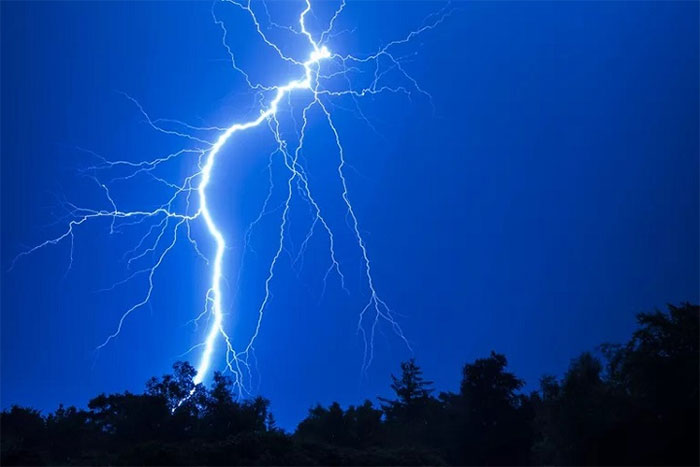How can weather changes cause headaches?
Most of us felt very well about Saturday afternoon's thunderstorm, understanding that it's time to stay indoors and relax. But for some, it's an early sign of an impending headache.
Things to know about headaches when weather changes
Let's find the scientific evidence that explains why a thunderstorm or changes in weather can cause headaches.
In recent days, cold air has continuously poured into the northern provinces, while the central region has rained and flooded, and the south has erratic rain and sunshine. The change of weather causes many people to suffer from dull, uncomfortable headaches.
The agent named weather
According to TS.BS Le Van Tuan, Head of the Department of Neurology - University of Medicine and Pharmacy, Ho Chi Minh City, Neurology Specialist, Tam Anh General Hospital in Ho Chi Minh City, there are 3 common types of seasonal headaches: migraine headaches. in the summer, cluster headaches in the spring and allergic headaches in the fall . Headaches at the change of seasons often occur in people who are sensitive to changes in temperature, humidity, light, air pressure. These factors cause blood vessels in the skull to constrict. abnormal relaxation, and increased anti-inflammatory, triggering headache.
For example, a study published on the website Cephalalgia surveyed more than 1,200 people with migraines. As a result, weather was listed as one of the four most common causes of headaches , with frequency occurring in nearly 50% of the participants.
Another study, published in The Journal of Headache and Pain , was done on 120 people with migraine or any other type of tension headache. It was also concluded that weather was one of the most common triggers.

Weather is listed as one of the four most common causes of headaches.
However, studies on the effects of weather on headaches and migraines have had mixed results. That is, in some studies it has been found that specific changes in weather can cause or prolong headaches/migraines, but in others, scientists have found that cannot prove a strong link between weather and headaches.
What about thunderstorms?
By now you're probably wondering if thunderstorms can cause headaches or migraines. Many people probably cannot forget the situation of going to work or staying at home on a cloudy and wet day accompanied by a persistent headache. Is this the result of this morning's thunderstorm? For many people, and even some experts, the answer will be "yes".
During a thunderstorm, streams of hot and cold air come into contact with each other, creating a huge difference in atmospheric pressure. This phenomenon creates the basic elements of all thunderstorms such as high winds and heavy rain. Changes in barometric pressure can also trigger headaches, including migraines, tension pain, or sinus pain. However, the claim that thunderstorms cause headaches is still a questionable phenomenon.
In addition, accompanying each thunderstorm will be lightning. Atmospheric noise (Sferic) — the electrical impulses generated by lightning — can also trigger migraines. Like thunderstorms, this phenomenon is still controversial among experts.
Barometric pressure and headache
Regarding barometric pressure, a study published in Internal Medicine , surveyed a small group of participants living with migraines in Japan. The questioners had to keep a diary of headaches for a year. In the recordings of half of the participants, low barometric pressure was blamed for migraines. Not only that, the results of the study also showed that half of the people surveyed had a higher frequency of headaches on the day immediately following the day when the barometric pressure was low.
On the other hand, a large study in Headache also examined 900 migraine patients, but could not find a link between the migraine and the drop in barometric pressure.
All in all, there's still no solid scientific evidence to explain why changes in weather cause headaches. However, if this is a frequent trigger for your headaches, it's essential then to be ready to manage your pain whenever there's a sign of rain (or any other physical factor). what weather) is approaching.
In addition, you can also create a headache diary yourself so that you can serve as a reference for your doctor to find solutions to prevent or reduce the impact of pain during a change. change to the next weather.
How to prevent and improve headaches during the change of seasons
Although it is not possible to completely prevent a headache from breaking out when the weather is humid, but according to TS.BS Le Van Tuan, applying the following ways will help limit this situation to the lowest possible level.
Follow the weather every day
Get in the habit of following the weather forecast or download the digital barometer app to your phone to update the barometric pressure every day. This way will help you anticipate unexpected changes in the weather, thereby proactively protecting yourself before a headache hits, for example: carry pain relievers with you, dress warmly when it turns cold, wear sun hats and sunglasses when going out in the hottest time.
Keep enough water for the body
Lack of water or dehydration is the cause that makes you prone to headaches during erratic weather days, especially when the humidity is high. Therefore, people with headaches should drink more water than the average person (average 8-14 cups of water per day). Water intake may vary depending on weight, gender, and intensity of body activity. People who often have headaches should keep a water bottle next to their bed so they can drink when thirsty or download a water reminder app so they don't forget to drink water every day.

Lack of water is one of the causes of headaches, so keep a water bottle next to your bed so you can drink it when thirsty. (Image: Shutterstock).
Take a warm bath
Relaxing in warm water can relieve headaches caused by abnormally high air pressure. In addition to taking a warm bath, you can also take a steam bath with hot water to open up the brain sinuses, bringing a sense of relaxation.
Eat scientifically, supplement with anti-free radicals
A reasonable diet, fortified with magnesium-rich foods such as dark green vegetables, fish, avocados, bananas. is thought to contribute to reducing pain receptors in the brain and preventing narrowing of blood vessels in the brain. . In addition, supplementing with B vitamins through dishes from oysters, salmon, beef, eggs. helps to reduce the impact of stress, and helps to improve headaches caused by weather.
According to TS.BS Le Van Tuan, people who often have headaches when changing seasons should supplement with products containing anti-free radical essence such as Blueberry and Ginkgo Biloba. This is a duo of nutrients that have been proven to cross the blood-brain barrier, contribute to anti-oxidants, assist in neutralizing free radicals, thereby protecting the vessel wall structure, increasing blood flow to the brain, and improving mood. headache, migraine due to weather.

With a small molecular structure, Blueberry has the ability to neutralize free radicals, help strengthen nerve connections, and contribute to headache relief. (Image: Shutterstock).
Self-massage
Massage helps relieve muscle tension and improves blood flow to the brain, thereby relieving headaches. Each person can give themselves a head massage by sitting in a chair with the most comfortable position, then using the fingertips to move around the head in a circular motion. Massaging with natural essential oils (melaleuca oil, lavender oil.) for 5 minutes can help you feel relaxed.
Cold compress
Applying a cooled towel or cold gel pack on the painful area for about 20 minutes will help ease the mind and ease, apply cold 2-3 times a day if the headache persists.
Sleep on time and get enough sleep
Sleep disruptions (sleeping too much or too little) make the body more sensitive to the weather, increasing the risk of headaches. You should make sure to sleep on time (go to bed at the same time every night) and get enough sleep (average 7-8 hours/day).
Exercise regularly
Regular exercise can both reduce pain levels and reduce the frequency of headaches thanks to its stress-modulating effect. Every day, you should spend about 30 minutes to an hour to exercise, maybe jogging, cycling, yoga or dancing, playing tennis. depending on your preferences.
TS.BS Le Van Tuan recommends that to cut headaches caused by weather, you can use over-the-counter (OTC) pain relievers or apply pain reliever cream/gel and anti-nausea medication (if the headache makes you sick). nausea). However, if you have taken pain relievers or fully applied the above solutions but the headache does not go away, visit your doctor for timely support. Absolutely do not arbitrarily increase the dose of pain relievers, causing dangerous side effects and making headaches harder to control.
- Headache due to weather changes and treatment
- Tips or cure headaches
- 9 common headaches and treatment
- Don't be subjective with headaches when the weather changes
- 11 habits that lead to headaches
- Top 5 causes of headaches in the summer
- The method of
- Warming weather can cause migraine
- Headaches, epilepsy because of parasitic roundworm in cats and dogs
- Foods that affect headaches
- Strange headache syndrome
- Smart people have less headaches
 13 causes of non-itchy rash
13 causes of non-itchy rash How the mouse with human ears changed the world?
How the mouse with human ears changed the world? The truth about 'fried rice syndrome!
The truth about 'fried rice syndrome! What is dental implant?
What is dental implant?